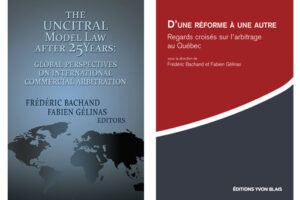On December 3, 2013, Gary Born, Chair of the International Arbitration Practice Group at WilmerHale in London and author of the leading treatise International Commercial Arbitration, delivered the annual John E.C. Brierley Memorial Lecture. His talk was titled “The Law Applicable to International Arbitration Agreements: Past, Present and Future.”
 Presented by the Faculty’s Research Team on Private Justice and the Rule of Law (PJRL), the lecture focused on the law governing the substantive validity of international commercial arbitration agreements. As a starting point for his inquiry, Born evoked the recognition of the separability doctrine: since the arbitration agreement is separable from the underlying contract or treaty, then what law governs it?
Presented by the Faculty’s Research Team on Private Justice and the Rule of Law (PJRL), the lecture focused on the law governing the substantive validity of international commercial arbitration agreements. As a starting point for his inquiry, Born evoked the recognition of the separability doctrine: since the arbitration agreement is separable from the underlying contract or treaty, then what law governs it?
Approaching the topic chronologically, Born recalled that in the past, choice-of-law rules took the view that the law of the judicial enforcement forum was the law governing the substantive validity of the arbitration agreement. This produced a wide variety of conceivable results, as there were necessarily as many laws governing the substantive validity of the arbitration agreement as there were enforcement forums.
The present, said Born, is imperfect, but better. While there is still a multiplicity of existing choice-of-law approaches, the New York Convention on the Recognition and Enforcement of Foreign Arbitral Awards and the UNCITRAL Model Law on International Commercial Arbitration provide tools to remedy the degree of uncertainty that remains. Born offered an engaging discussion on the main choice-of-law approaches applied around the world – from the law of the arbitral seat to the law of the main contract, he explained the closest connection test and the cumulative principle, and finished by exemplifying the approach of English, French, and US courts.
Turning to the future, Born suggested that the principled and desirable choice-of-law approach was the validation principle, according to which the validity of an arbitration agreement will be upheld if it is substantively valid under any of the laws that might potentially be applicable to it, even if it is not valid under one or several of them. This, Born concluded, best accomplishes the parties’ objectives when agreeing to arbitrate: having an efficient, neutral, and expert means of resolving their disputes without the jurisdictional and choice-of-law complexities encountered in national court litigation.
By Sophie Poirier, Research Assistant, Private Justice & Rule of Law
 More on arbitration
More on arbitration
The Faculty is pleased to announce the publication, last December, of two books co-edited by Professors Frédéric Bachand and Fabien Gélinas, of the Private Justice and the Rule of Law Working Group:
D’une réforme à une autre : Regards croisés sur l’arbitrage au Québec (Éditions Yvon Blais, 2013, 665 pages);
The UNCITRAL Model Law after Twenty-Five Years: Global Perspectives on International Commercial Arbitration (JurisNet, 2013, 380 pages).
[ JUMP TO THE CURRENT EDITION OF FOCUS ONLINE ]
